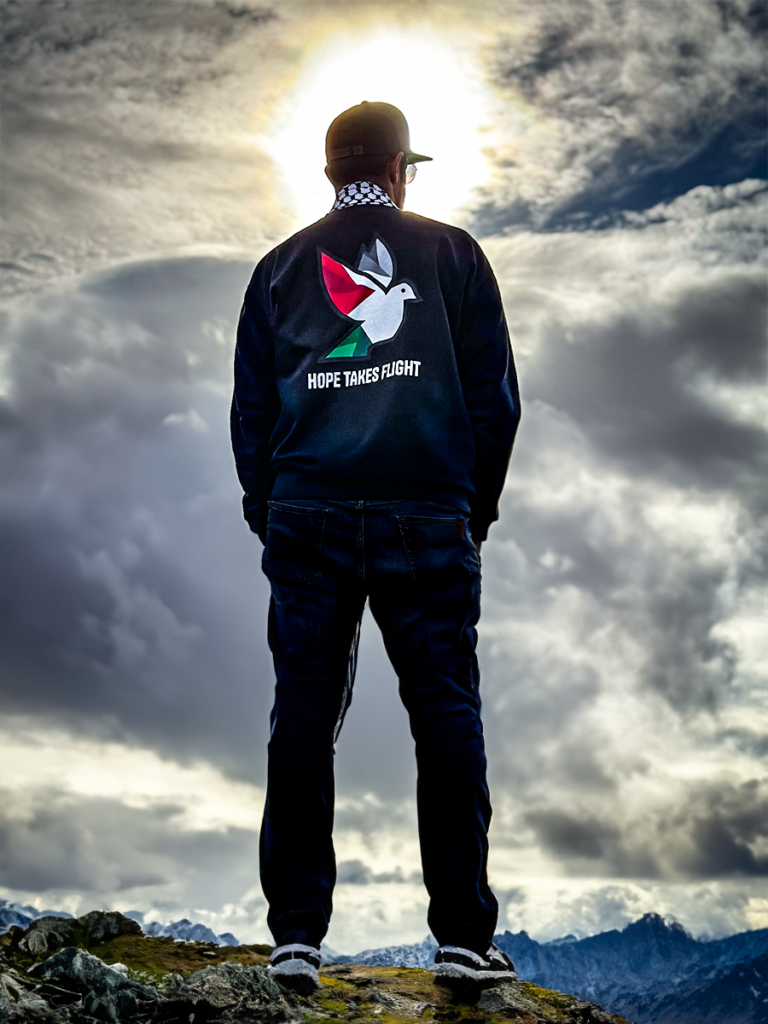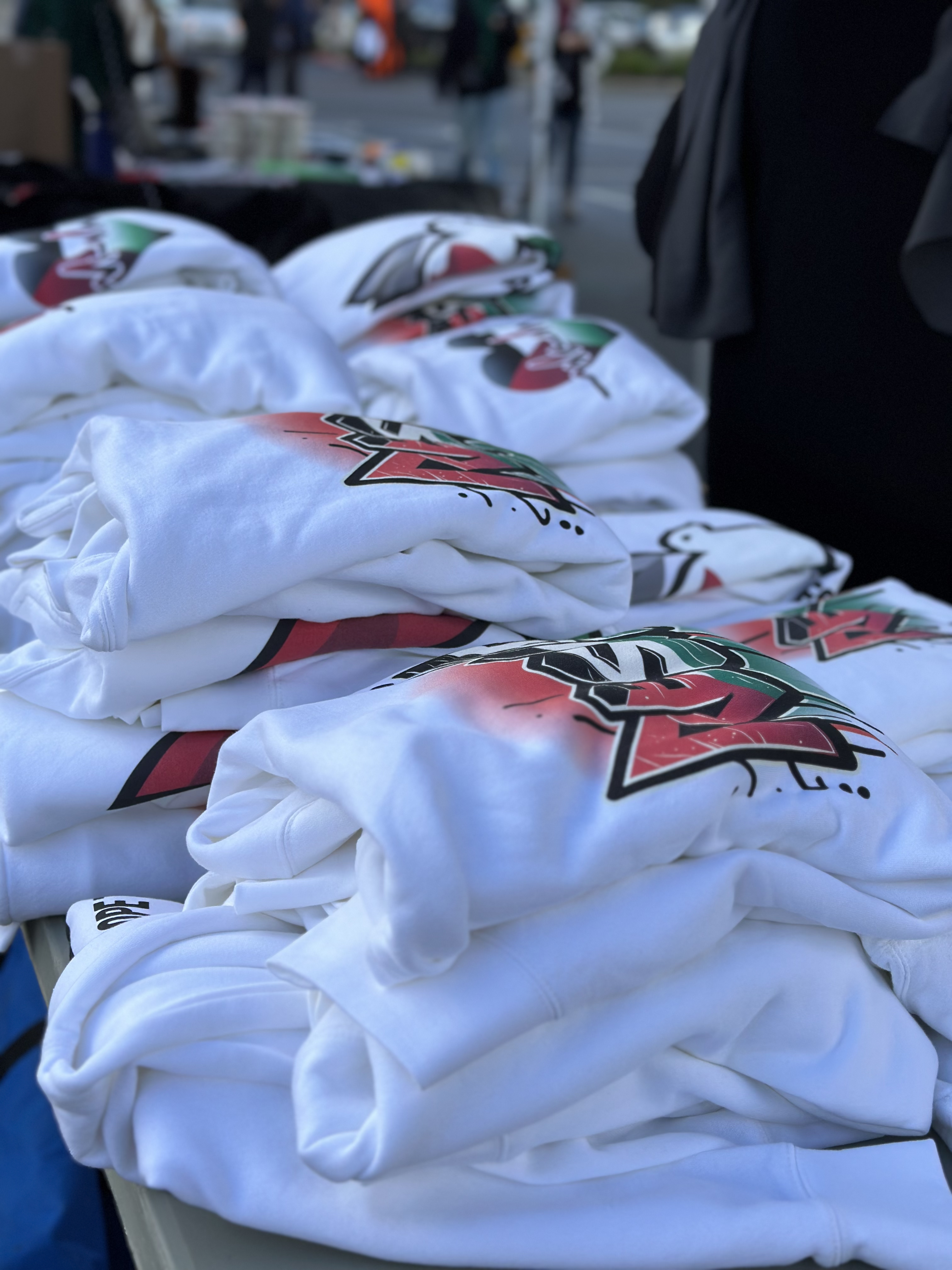Bay Area Teen Launches Clothing Line for Palestine
By Muhammad Hadi
Jan/Feb 2024


The death of a single person casts a shadow over a community, drawing people together in shared grief. When a family is lost, the community’s fabric is torn, left with a wound that struggles to heal. Yet, what happens when whole generations are systematically wiped from existence? The pain and loss are magnified, yet the response from those powerful enough to make a difference is often muted, hidden behind justifications and political tapestries. Innocent children, whose only understanding of the night sky was the stars, are now acquainted with the darkness of man’s inhumanity. Their laughter and dreams, once so vibrant, now lay buried under the weight of rubble and indifference. The world, it seems, looks away, unable to face its reflection in the tragedy.
These images and stories haunted me, a relentless stream of what seemed like distant problems. And yet they were all too real for those living them. “We can’t do anything,” becomes a convenient curtain to hide behind. But I saw through it every time I closed my eyes and every time I heard the news. It was a lie told to soothe the world’s disquieted conscience, a shield against the harsh truth that we are all, in some way, connected to these distant tragedies.
As a student in the Bay Area, already immersed in Islamic multimedia and juggling academic pressures, I felt the pull of these global issues. They demanded more than my attention; they demanded my voice and my action. I realized that my daily struggles, exams and projects paled in comparison to the plight of those who had lost everything. The idea of starting a clothing brand had once been a flicker of inspiration for me, a way to express my creativity and individuality. But as I grew more attuned to the cries for help echoing from lands I’d never walked, that flicker transformed into a blaze of determination.
Hobby to Platform
What started as a cool hobby began to morph into a brand in my mind. It was no longer just about fashion or trends; it became a potential platform, a way to merge my creative impulses with my deepening desire to effect change. Between classes, I sketched designs, each line drawn being a silent pledge to the cause I was slowly, but surely, embracing. I found myself staying up late, my mind racing with ideas of how to use this platform for something bigger, something meaningful.
As the months unfolded, LUMOS started to really come into its own. The name, meaning “light,” became symbolic of my aspirations. I wanted LUMOS to be a source of light in the darkness, a spark of hope against despair. It wasn’t just a label; it was a statement, a commitment to shed light on the harsh realities that seemed to be shrouded in the shadows of the world’s attention. The brand began to represent a beacon of awareness, illuminating the stories that were otherwise overlooked.
Infusing garments with stories that matter became my mission. Using the language of design to speak truths that words alone couldn’t capture, each piece from LUMOS was more than just part of someone’s wardrobe. They were conversation pieces, quiet yet powerful advocates for those whose voices were being drowned out. I wanted each design to be impactful, to resonate with the wearer and the observer, to start conversations and challenge perceptions.
LUMOS was set to be a line of clothing that did more than just look good. It was about clothing that felt good — not just in texture, but in the conscience. Every sale, every thread, every color choice was intentional, designed to capture attention, to spark dialogue, to make people stop and think and, hopefully, to act. It was fashion with heart, style with soul, and threads with a cause. The intersection where aesthetics met ethics, where every item carried the potential to light up not just an outfit, but also a path to change.

The rallies — the outpouring of support for the world’s oppressed — were a turning point. It was a global call to action, and it spurred me into motion. LUMOS was no longer just an idea; it had become a necessity. I rallied my friends, classmates and community members. Together, we poured our collective passion into making it a reality. I was inspired to see fellow students, previously uninvolved, dedicating hours to support this cause. They went out of their way to promote our first event, ensuring that our community was aware and engaged.
Our first event was more than just a sale; it was a statement. The community’s response was overwhelming. They didn’t just buy clothes; they bought into an idea, a movement. We nearly sold out what was merely a preview of our brand, and the proceeds — more than $400 — went straight to emergency humanitarian aid. This event was proof that even as students, our actions could resonate. It was a testament to the power of collective action and a beacon of hope for the future.
As we prepare for our official launch, I stand ready to weave our message into the broader tapestry of social consciousness. With designs that champion unity and echo the moral imperatives of our faith, we seek to dress the world not just in clothes, but in hope, solidarity and action. Our upcoming collections will continue to fundraise, educate and rally a community of believers in the power of change. Through LUMOS, we’re not just creating fashion; we’re creating a movement. We’re changing the narrative, proving that even the smallest of voices can make the loudest of echoes.
The world may whisper, “We can’t do anything,” but through LUMOS, I shout back, “Watch us.”
Muhammad Hadi, first prize winner in the Islamic Horizons “Palestine on my mind” writing contest, is a multimedia content creator based in Bay Area, Calif. For the last six years, he has started and grown projects for youth, including a podcast interviewing Muslims in tech, medicine, animation, education, and more. He is currently a senior in high school, and working as a growth engineer at a Y Combinator-backed startup. His Palestine-themed clothing line is available at https://lumoswear.com/.
Tell us what you thought by joining our Facebook community. You can also send comments and story pitches to horizons@isna.net. Islamic Horizons does not publish unsolicited material.
